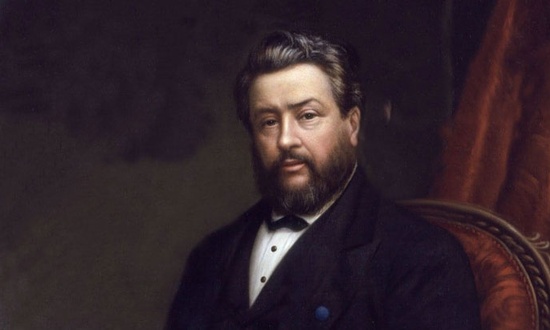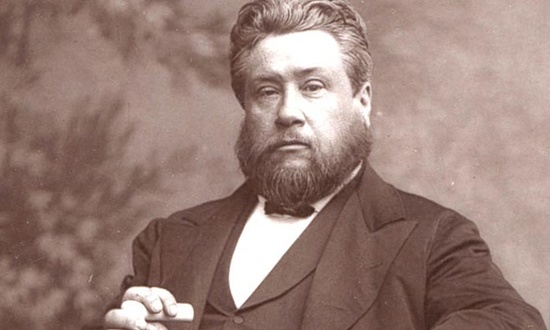Note from Randy: I’d been a pastor for ten years before I discovered the writings of Charles Spurgeon, and then I couldn’t get enough of him. The Bible oozed out of his pores, and he let Scripture be Scripture, rarely twisting it to fit his theology.
One of my books on Heaven, We Shall See God, contains segments from his sermons on Heaven, so about 60% of the book is Spurgeon. It was one of my favorite books to work on, since I extracted my favorite portions from many of his messages. One day I’ll meet him and say, “Don’t know if you realized we were co-authors. There really wasn’t any way I could ask your permission!”
I enjoyed these writings from Spurgeon on the gospel and Jesus, which I found through the excellent Logos software.
“But the word of the Lord endureth for ever. And this is the word which by the gospel is preached unto you.”—1 Pet. 1:25.
ALL human teaching and, indeed, all human beings, shall pass away as the grass of the meadow; but we are here assured that the word of the Lord is of a very different character, for it shall endure for ever.
We have here a divine gospel; for what word can endure for ever but that which is spoken by the eternal God?
We have here an ever-living gospel, as full of vitality as when it first came from the lip of God; as strong to convince and convert, to regenerate and console, to sustain and sanctify, as ever it was in its first days of wonder-working.
We have an unchanging gospel, which is not to-day green grass, and to-morrow dry hay; but always the abiding truth of the immutable Jehovah. Opinions alter, but truth certified by God can no more change than the God who uttered it.
Here, then, we have a gospel to rejoice in, a word of the Lord upon which we may lean all our weight. “For ever” includes life, death, judgment, and eternity. Glory be to God in Christ Jesus for everlasting consolation. Feed on the word to-day, and all the days of thy life. [1]
“I am come a light into the world, that whosoever believeth on me should not abide in darkness.”—John 12:46.
THIS world is dark as midnight; Jesus has come that by faith we may have light, and may no longer sit in the gloom which covers all the rest of mankind.
Whosoever is a very wide term: it means you and me. If we trust in Jesus we shall no more sit in the dark shadow of death, but shall enter into the warm light of a day which shall never end. Why do we not come out into the light at once?
A cloud may sometimes hover over us, but we shall not abide in darkness if we believe in Jesus. He has come to give us broad daylight. Shall he come in vain? If we have faith we have the privilege of sunlight: let us enjoy it. From the night of natural depravity, of ignorance, of doubt, of despair, of sin, of dread, Jesus has come to set us free; and all believers shall know that he no more comes in vain than the sun rises and fails to scatter his heat and light.
Shake off thy depression, dear brother. Abide not in the dark, but abide in the light. In Jesus is thy hope, thy joy, thy heaven. Look to him, to him only, and thou shalt rejoice as the birds rejoice at sunrise, and as the angels rejoice before the throne. [2]
Faith and the Nature of Christ
No idea of the Lord Jesus Christ approaches to correctness which does not see in his one person the two natures of God and man united. In that person, wherein were blended, but not confused, the Godhead and the Manhood, a practical faith has its most ample help. Jesus sympathizes with the condition in which the struggler after excellence finds himself, for he also was tempted in all points like as we are; he knows the difficulties which grow out of the infirmities of flesh and blood, for he felt sickness and pain, poverty and hunger, weakness and depression. It is a great gain in a human career, a specially suitable assistance, to have an unlimited power at one’s side sympathizing with our weakness.
Nor is the advantage less in the other direction, for here is a Man, bound to us by relationship and affection the most intense, who is not only tender to the last degree of our suffering nature, but is also as wise as he is brotherly, and as mighty to subdue our faults as he is gentle to bear with our frailties. His Manhood brings Jesus down to us, but united with the Divine nature it lifts us up to God. The Lord Jesus thus not only ministers to our comfort, but to our betterment, which is the greater concern of the two.
Could faith believe in a Being more answerable to all our needs, more helpful to our noblest longings? Allied to Jesus, we confidently aspire to such likeness to our Creator as it is possible for a creature to bear.
Enthusiasm for the Person of Jesus
The love of the believer to the Lord Jesus is intensely personal and enthusiastic. It overtops all other affections. His love, his sufferings, his perfections, his glories fill the heart and set it on fire. There is more force in the love of an actual living person than in subscription to any set of doctrines however important they may be. The courage of a leader has often produced deeds of daring which no philosophy could have demanded. Our glorious leader, Christ Jesus, inspires his followers with a burning passion, an all-consuming zeal, an irrepressible enthusiasm, which supplies all the energy which the noblest life can need. It is no small aid to our noblest ambition to have our hearts captured by incarnate holiness.
Faith in the Life of Christ on Earth
The more we examine the character of the Lord Jesus Christ, the more are we filled with admiration of it. In the gospels we have a fourfold photograph of his countenance, taken from different positions. Putting these together, or even meditating upon any one of them, we are charmed with its singular beauty. Nor is this at all remarkable, for almost every man in the world, believer or unbeliever, has acknowledged the singular excellence of the life of Christ. It is so original, so transcendent, so perfect, that all men, except certain blinded partisans, sworn to run-a-muck at all things holy, have bowed before its glory, and regarded it as the beau-idéal of perfect manhood. Now this is in Scripture set before us as an example, therefore it is imitable; and better still, it is set forth as the ordained pattern to which the believer is to be conformed are God’s great work is done. To have a high ideal, to be assured that we can reach it, and to have a capable Helper, who will enable us to reach it—this is to have a grand assistance towards a life of virtue. Faith in this Exemplar, who is also our Saviour, must minister strength in our life-battle. To aspire to such a perfect character, as the salvation which we most desire, is to be already saved in principle. It is a great comfort to be fired with an ambition to be like Jesus. Salvation from hell to heaven every selfish wretch may wish for; but to be saved from selfishness into the image of Christ is that which only the renewed in heart are pining for, and by that pining their salvation is assured.
Faith in the Principles of Christ’s Life
It is observable that the self-denial of our Lord Jesus, which was complete and entire beyond all suspicion, proved to be for him the way to that pre-eminence of glory which he now enjoys. He is above all things because he stooped to the lowest and meanest state. It is his honour that he laid aside his glory, and bowed to the greatest shame and scorn. His glory in the hearts of his redeemed is this, that he made himself of no reputation, and took upon him the form of a servant, and even died, the Just for the unjust, to bring us to God. No secondary motive deteriorated the compassionate self-sacrifice of Jesus; yet the abnegation of himself has turned to his boundless exaltation. Faith perceives this, and knowing that in this case one rule holds good for the Leader and the follower, it accepts all manner of service however menial, and consents with alacrity to a thorough self-emptying. To lose one’s life for truth’s sake and love’s sake is according to Biblical philosophy to save it. The complete sinking of self is the surest road to glory and immortality. Herein is the soul prepared or all ill-weathers, and rescued from a passion which is of all things else the most weakening to the force of virtue. [3]
[1] Spurgeon, C. H. (1893). The cheque book of the bank of faith: being precious promises arranged for daily use with brief comments (p. 244). New York: American Tract Society.
[2] Spurgeon, C. H. (1893). The cheque book of the bank of faith: being precious promises arranged for daily use with brief comments (p. 70). New York: American Tract Society.
[3] Spurgeon, C. H. (1892). The Clue of the Maze (pp. 94–101). London: Passmore & Alabaster.
Photo by Jessica Delp on Unsplash




